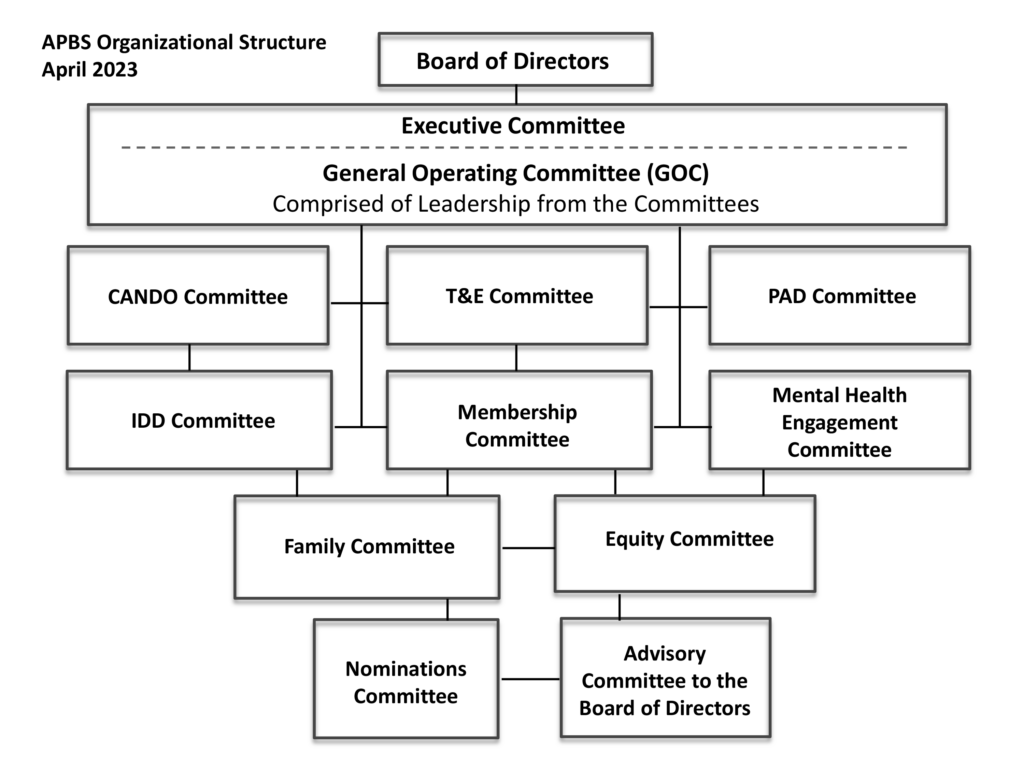Description
The Association for Positive Behavior Support is a multidisciplinary organization made up of professionals (teachers, researchers, university professors, and administrators), family members, and consumers who are committed to the application of positive behavior support within the context of the school, family, and community including across systems (e.g., entire schools, organizations), for small groups, and for individuals with complex needs for support.
Organizational Infrastructure
APBS members vote for the Board of Directors who each serve a three-year term. Fourteen Board of Directors meet quarterly by conference call. The Board votes each year for a President, Vice President, Secretary, and Treasurer who meet monthly as the Executive Committee. The President sets the agenda for the Full Board meetings while the Executive Director, with feedback from the President, sets the agenda for the Executive Committee Agendas. Once a year, the Full board meets on-site for an entire day before the conference begins to complete the business of the Association. Additional full day meetings are scheduled, often in the summer or fall, however, this only occurs when the Board has outstanding business to be addressed. The President appoints Ex-officios to serve as non-voting members of the board when additional information from stakeholders is necessary. The Editors of the Journal of Positive Behavior Interventions are appointed Ex-officios during their term in office. Another three to four Ex-officios are appointed to represent stakeholder groups that currently are not reflected within the APBS Board of Directors.
Mission, Vision, and Equity
Mission Statement
Vision Statement
Equity Statement
More About APBS
APBS is a membership organization that engages in varied activities and endeavors related to Positive Behavior Support. APBS places greatest emphasis on activities associated with expanding the emerging science of Positive Behavior Support. Beyond expanding the science of Positive Behavior Support through research and outreach endeavors APBS further invests its resources in supporting networking related to the design and implementation on Positive Behavior Support across various contexts. As such, APBS is primarily a scientifically oriented organization that is also heavily invested in networking. APBS also supports (on a more limited basis) policy-related endeavors associated with Positive Behavior Support. APBS members have access to all association materials through various sources including the organization’s website (www.apbs.org). Further, members of the organization elect members to its governing board on an annual basis and may access those elected board members through a variety of methods including the website.
Positive Behavior Support is a set of processes that combine information from social, behavioral, and biomedical science and applies this information at the individual and/or systems level to reduce behavioral challenges and improve quality of life. Both systems-wide and individualized interventions used in positive behavior support are empirically documented and can be used by a wide range of support providers.
The Association for Positive Behavior Support is currently supported by the activities of several working committees and a 12 member board. Nominations for board membership are solicited from our members. If you are interested in participating in a committee or exploring leadership opportunities, please e-mail Executive Director Tim Knoster.
The Association for Positive Behavior Support is an active body, focusing its attention on dissemination, education, and public policy efforts. It:
- Serves as an international forum for individuals interested in positive behavior support
- Hosts a conference every year
- Supports and promotes the Journal of Positive Behavior Interventions
- Publishes a quarterly newsletter
- Manages and links websites on positive behavior support practices, systems and examples
- Engages in policy development around the provision of behavior support
- Establishes a directory of members to facilitate interaction among individuals interested in positive behavior support practices
- Works to establish national standards that define competency in the application of positive behavior support
- Encourages the training of professionals skilled in positive behavior support practices through the development of training materials, and the embedding of positive behavior support content in relevant professional certificate and degree programs
- Promotes access to state-of-the-art books and literature pertaining to positive behavior support
Organization Policies
- APBS Virtual Community: Disclaimer and Expectations
- This twofold policy document describes first the committee structures and content approval process for content approval on a) the publicly available portions of APBS.org, and b) the portions of APBS.org available only to logged in members of APBS. The APBS Social Media Policy, the second portion of this document, describes the content approval process for posts on APBS Social Media platforms.
- APBS Website Content/Social Media Policy
- This policy document describes reporting processes and community expectations for all APBS virtual communities, including interactive portions of APBS.org and APBS Social Media Platforms.
- APBS Policy Statement
- Data Access Policy
- APBS Event Emergency and Inclement Weather Policy
- APBS Standards of Practice (2007)

